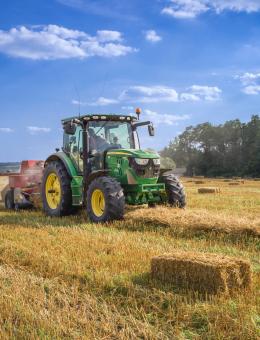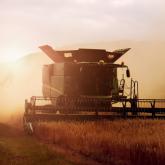
THE IMPORTANCE OF A FARM POLICY TO TACKLE BLACKGRASS
Published 23 August 2025
In the very tight financial position which most farms find themselves, anything which affects yields even in a small way is something that needs to be tackled – and the problem of blackgrass is certainly not a minor issue, writes James Hill. Just 12 blackgrass plants per square metre can reduce yields by 5%, and higher densities can cut yields by as much as two tonnes per hectare.
With the weed becoming ever more prevalent and with evidence that it is starting to develop a resistance to certain herbicides, this is not a problem to sweep under the carpet. It is vital to have a farm blackgrass policy.
The policy will need to encompass the whole way that farming the land is managed. This will include a sensible cropping rotation policy, with a five-year rotation regarded as the optimal strategy, with the plough used as a ‘reset button’ depending on conditions.
Other factors in that blackgrass policy will include crop variety choice. It is always tempting to pick those varieties which will in theory provide the highest yield, but if the difference is 2-3%, and the lower-yielding variety is easier to manage in terms of blackgrass control (perhaps because it can be drilled later and will grow more vigorously) could be a better bet in the long run.
Drilling dates and rates will both have an impact. Delayed drilling may mean a shorter drilling window, which in turn may mean investment in wider drills to get the job done. But equally that delay could result in a big saving on herbicide costs, so the policy has to take all of this into account.
Two other factors are crucial: eliminating blackgrass seeding by hand rogueing in the spring and ensuring good machine hygiene including blowing down the combine after cutting an infected field.
The costs of overlooking the problem of blackgrass are too high to ignore. The combination of resistance to herbicides and potentially lower yields means this is an issue which needs confronting now. Having a joined-up approach as part of a farm policy will always be better than the traditional approach of individual operators making decisions on-farm and leaving the agronomist to find a solution from a herbicide can.
Perhaps with the wheat price where it currently is; fallows could even be considered. Certainly, food for thought if not for stomachs.
Share this story
Arnolds Keys Blog

LIVING ABOVE THE SHOP: THE APPEAL OF MIXED USE PROPERTY INVESTMENTS
20 August 2025
Not so long ago, ‘living above the shop’ was a common situation for many business owners, writes Harry Downing. Read more >

THE 1,000 DAY TENANCY – AND WHY IT’S GOOD NEWS FOR LANDLORDS
15 August 2025
Anyone who thinks that the residential lettings market is characterised by a highly transient population of tenants moving on every few months may be surprised to learn that that the... Read more >

FIRST-TIME BUYERS STEPPING IN TO REPLACE SECOND-HOMERS
8 August 2025
They say it’s an ill wind which blows nobody any good, and the slowdown in the second homes market brought about by the increase in council tax on such properties... Read more >

AT LAST, A LITTLE GOOD NEWS
19 July 2025
Much like the rest of the country, farmers awaited Rachel Reeves’ spending review with apprehension, but it was after the event that the big news came, and for once it... Read more >
